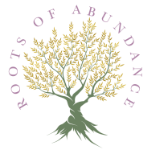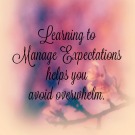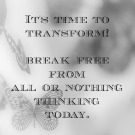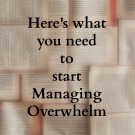How do you feel about change? Does it scare you? Do you roll with it? Do you relish the thought of change, or are your feelings about it dependent on what the change is and how much that change may require you to be vulnerable?
It is in vulnerability that we can learn to dance with, not against, the current of change. It is in managing our fear and vulnerability that we manage and are successful with change.
What is Vulnerability?
Merriam Webster defines being vulnerable as:
- Capable of being physically or emotionally wounded
- Open to attack or damage
Brene Brown has a similar if not a bit gentler definition:
I define vulnerability as uncertainty, risk, and emotional exposure. To be human
is to be in vulnerability.
Vulnerability is crucial for change because we’re often uncertain of the outcome. We’re not only uncertain about “practical outcomes,” which are what happens in our day to day lives, but we’re also uncertain about mental and emotional outcomes.
The willingness to take a risk, to put ourselves out there, often in the public eye, and open ourselves up to a variety of feedback makes us human. We go out on a limb in the hopes of being validated and heard. And when we reveal our needs and wants, and that we cannot always take care of those needs and wants ourselves (nor should we be expected to), we reveal ourselves as imperfect.
Vulnerability tests our willingness to get in touch with our true selves; it asks us to show up authentically, as we truly are,
without knowing how we will be received by others.
Why We Fear Being Vulnerable
One of the biggest reasons people resist being vulnerable is the fear of appearing weak. We live in a culture where individuality is prized, and though this is indeed a great thing, it can also create the mindset of, “I need to have everything figured out.” This pressure to have things “all figured out” can sometimes override our need to ask for help when we truly need it.
Vulnerability sounds like truth and feels like courage. Truth and courage aren’t always comfortable, but they’re never weakness.
Brene Brown
Instead of viewing asking for help as weakness, try to view that request instead as an opportunity to find and connect with those who are current wisdom keepers and potential new allies. How powerful could you be if you used vulnerability opportunities as a way to not only strengthen your courage muscles, but to also learn things by meeting new people, or by deepening your connection with those you know?
Change can be uncomfortable and sometimes downright squirmy. When we step into that place of uncertainty, we don’t quite know what will happen if we reveal something about ourselves or ask for something, we’re afraid we’ll be rejected, dismissed, misunderstood or abandoned by our current circle of friends. The truthbomb of the matter is rejection, dismissal, and abandonment could happen. This is uncertainty and risk. This is where incremental small steps toward change can be powerful; small steps give you the chance to practice changing and communicating your changes in ways that allow you to expand your comfort zone slowly and build your confidence along the way.
How to Manage Vulnerability and Change
Managing vulnerability and change boils down to figuring out how you want to show up in the world. It’s not a game you can win or lose; it’s simply an ongoing decision. How do I need to be vulnerable to change, and how can I approach that vulnerability through a willingness to connect with myself and others?
Vulnerability is not winning or losing; it’s having the courage to show up and be seen
when we have no control over the outcome.
Brene Brown
Taking calculated risks allows us to build confidence and resilience. It helps us attract people who can help us with the highest and best of intentions. Connection through vulnerability reminds us that it’s OK to not “have it all figured out.” In many cases, having it all figured out is an unreasonable expectation we’ve placed on ourselves, usually to our detriment.
Managing our ability to change often forces us to remember that we are the only ones who define our worth and value. Instead of looking for others to validate us, we must first look inside and develop an unwavering love for ourselves.
Our self-love and the lessons we learn from changing are the rewards we receive
for our courage, bravery, and willingness to be vulnerable.
One final benefit of embracing vulnerability is recognizing what can go right when we allow ourselves to truly be seen. How empowering could it be to approach change and vulnerability opportunities with the mindset of, “What can go right here, and how can that reward me?” Many times you may be surprised at the reaction of others when you ask for help, address your needs, or simply tell your truth with a sense of kindness and compassion.
Vulnerability asks us to embrace ourselves as imperfectly perfect human beings full of contradictions, doubts, and aspirations. Vulnerability asks us to manage our fears and dance with change instead of viewing it as an insurmountable mountain waiting to be climbed. Willingly accepting vulnerability is an opportunity to connect more with others. It is the ultimate way to develop the self-love and self- acceptance we need to be successful in the changes we want to make each and every day.






